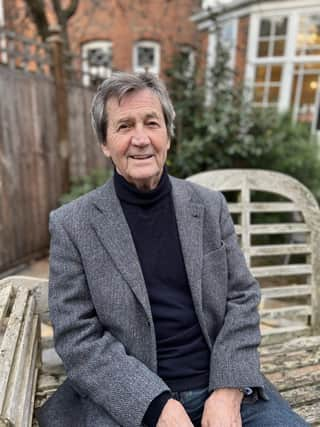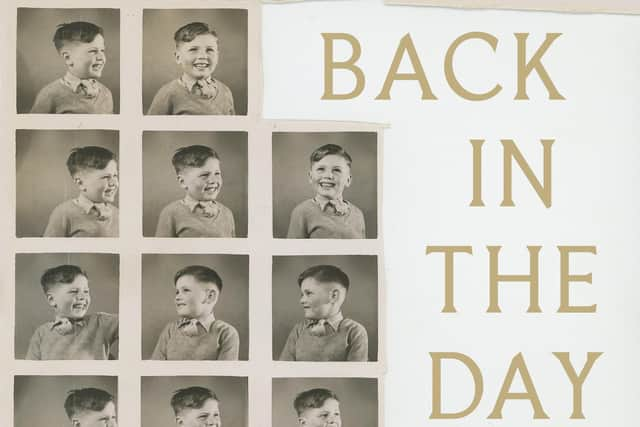Melvyn Bragg talks about his childhood as he prepares to appear at Ilkley Literature Festival


“I would have been quite happy staying at home in Cumbria,” he recalls. “I really didn’t want to leave. Many of my friends stayed and worked for the council or even the local factory - I think I would have been quite happy.”
But, pushed by Mr James his secondary school history teacher who spotted his potential, Bragg did indeed leave home at 18 to study Modern History at the University of Oxford before gaining a traineeship at the BBC going on to lead many flagship arts programmes including Radio 4 documentary series In Our Time and then as editor and presenter of ITV’s The South Bank Show.
Advertisement
Hide AdAdvertisement
Hide AdBut part of his heart, if not most of it, stayed in Cumbria.


At the age of 82 he has written his first memoir, a tribute to the place and the people who influenced his early years from six to 18.
“I was approached to write a memoir in the past but it didn’t interest me,” says Bragg who was made a peer by Tony Blair and still sits in the House of Lords.
It was his ill health (he has had a number of cancers and a collapsed lung) that changed his mind.
Advertisement
Hide AdAdvertisement
Hide Ad“I thought if I could only ever write one more book what would it be about and I knew it had to be about the place and the people where I grew up. I’d written about the place in some of my fiction before but not factual. It is a town of five thousand people and had a couple of factories and was very representative of Britain at that time. was a unique time. We were just coming out of two world wars when I turned six (Bragg was born in 1939) and the people at the time made such a lot out of so little. A lot of the housing was slums and they had very little and yet they were so resilient. They had two winners at Crufts, they had winning football and rugby teams But I didn’t just want to write a social history, that would have been boring and so I thought I would personalise it.”
And personalise it he did. Back in the Day: A Memoir paints a vivid and captivating picture of Bragg’s early childhood. An only child, the story starts with Bragg’s father Stan returning from war and the family moving to a flat above the Black-a-Moor pub which his father and mother Ethel then ran.
Bragg’s childhood, spent running madly about the streets with his friends (‘the town was our globe... the streets our living room’), is set against an unforgettably affectionately drawn backdrop of kind but strict grown-ups who laced the place with a sliver of fear.
“Because we lived above the pub and I would help dad with the beer barrels, and people were coming in and out all the time, it was a great way to get to know people, we knew nearly everyone in the town. The pub was the heart of the community. I as an only child but I never felt lonely. It was working class, but not everyone was poor, there were some very wealthy people as well.”
Advertisement
Hide AdAdvertisement
Hide AdWhat is incredible is that Bragg has written the memoir, which he admits could have been twice as long and he to edit large parts out (‘maybe I’ll write another’), completely from memory. He never kept a diary but his searing intellect and unwavering memory recollect things accurately.
When I remark on this he doesn’t seem to think having such a recollection of people and events as being unusual.
"Mostly I remember the people. They were mostly northern working class and yet these were the people at the heart of delivering the industrial revolution. I wanted to create a record of that time from my memories as a boy growing up there. I thought if I did research it would just slow me down. I wanted to remember how I really felt. I wanted to think about how my dad felt returning from the war.” And the result is a critically acclaimed memoir that takes readers back to a particular period of time seen through the eye of a young Bragg.
But Back in the Day is not all roses round the cottage. In fact the book’s first words are ‘I was brought up in a house of lies’. The main lie of Bragg’s childhood was that his mother Ethel had in fact been born out of wedlock, the father unknown, and Ethel’s birth mother had been ‘eased out of the religiously enwrapped town a few months on’. Ethel, who was raised by a foster mother, Mrs Gilbertson.
Advertisement
Hide AdAdvertisement
Hide AdBragg only discovered the truth in his teens. “I realised I had grown up in a house where my cousins weren’t my cousins and my grandmother wasn’t my grandmother.” He wondered whether the town was sprinkled with half-siblings, and which old man on the street might be his grandfather.
He also writes openly about suffering a breakdown when he was 13. His resulting overzealous work ethic, he says, helped him cope with his mental health problems.
“If I filled my head with books and work then it couldn’t fill with terrible thoughts going on in my head,” he says candidly. “It drove the terrors away. But I also liked doing it although I never planned to go to university or work for the BBC. It never occurred to me that I wouldn’t stay in Wigton.”
But that is exactly what happened, although he still has a house close to the town but he says it is very different now.
Advertisement
Hide AdAdvertisement
Hide Ad"The factories have closed down and housing estates have sprung up, it is very different.”
In his 20s he concentrated on becoming a writer as well as getting married to his first wife and starting a family. He became increasingly political, becoming a Labour Party donor under the leadership of Tony Blair. In 1998 he was appointed by Blair to the House of Lords as the life peer Baron Bragg, of Wigton in the County of Cumbria, one of a number of Labour donors given peerages.
"Being in the Lords gives me the unique ability to raise issues about the arts and education that I am passionate about.” Although he is still a keen defender of a second parliamentary chamber, he does admit that the Lords could do with reforming.
"I wouldn’t want to see an elected second House as that is far too much like the Commons and you can’t have a rival to the Commons.”
Advertisement
Hide AdAdvertisement
Hide AdFor 15 years, from 1999 to 2017, he was Chancellor of the University of Leeds – the first not to have been a member of the Royal Family or an hereditary peer.
"It was surprised and delighted to be asked,” he says. “I had 15 very interesting years there and in all that time I never met one student at Leeds who wasn’t having a wonderful time.”
Melvyn Bragg will be appearing at the Ilkley Literature Festival 2022 which runs from Friday 7 October and until 23 October. www.ilkleyliteraturefestival.org.uk
Back in the Day : A Memoir by Melvyn Bragg Sceptre £25